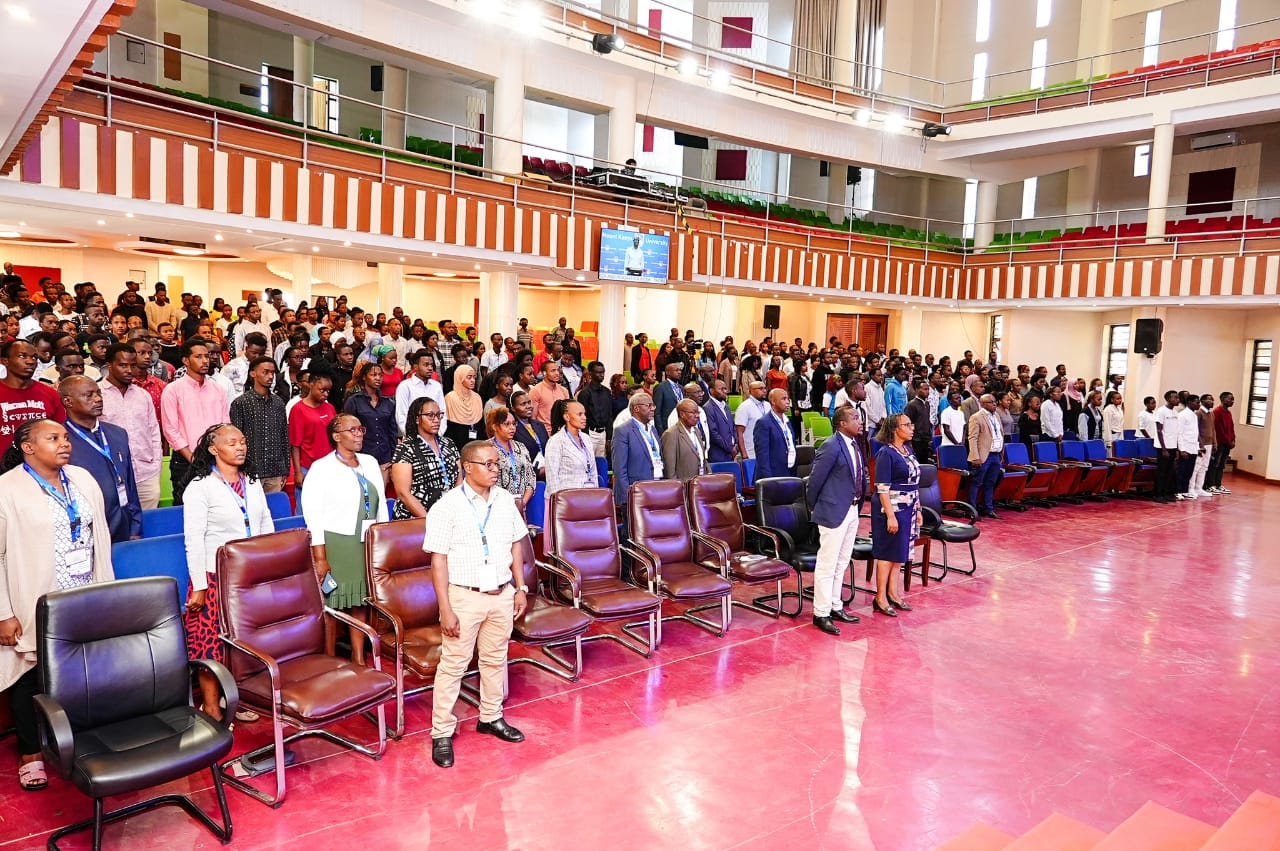Mount Kenya University (MKU) has kicked off its annual Research and Innovation Week that started from Monday October 14 to 18 at its main campus in Thika.
Themed “Research and Innovation for Sustainable Production and Livelihoods,” the event has attracted a wide array of stakeholders, including representatives from higher education institutions, TVETs, industries, government bodies, international partners, and individuals.
Dr. Francis Makoha, MKU’s Director of Research and Innovation says the forum platform allows participants to showcase inventive ideas that could lead to pioneering products and services, such as spin-offs and new ventures. Additionally, it aims to strengthen partnerships with industry through the service-learning (SL) initiative, which integrates real-world experience into the academic process.
“A key focus is enhancing partnerships through MKU’s Service-Learning (SL) initiative, aligning academic programs with industry needs to equip students with hands-on experience for career success,” says the chairman of the organizing committee, Dr. Henry Yatich.
According to Dr Makoha, there is a critical need to scale up research and innovation. He stressed that for research to truly benefit society, it must be both innovative and transformative, particularly in addressing the pressing social and economic challenges facing the country. “Research must not only generate knowledge but also create solutions that address real-world problems,” Makoha said.
He highlighted that when embraced, innovations can grow into thriving businesses, providing much-needed employment opportunities for Kenya’s youth. “For instance, there is a growing health risk posed by the influx of immigrants entering Kenya daily. Many immigrants bring infectious diseases that, if undiagnosed at the point of entry, could pose a significant health risk,” he noted.
Citing an example, he recalled that three years ago, Kenya had been declared measles-free, but recent outbreaks have raised concerns. These cases, he said, stem from undiagnosed immigrant’s children harbouring infectious diseases. Dr. Makoha also drew attention to the recent outbreaks of diseases such as monkeypox (Mpox), which originated in Central Africa, and the lingering effects of the COVID-19 pandemic, which spread globally despite originating in China.
“It is important to implement robust screening and surveillance measures at entry points to prevent such outbreaks. Had stringent health measures been in place, the spread of diseases like COVID-19 could have been averted,” he added.
However, Dr. Makoha acknowledged that the lack of funding and insufficient support from the donor community and the government remain significant challenges in scaling up research and implementing preventive measures.
Students who attended the event echoed these concerns, expressing surprise that Kenya, despite its independence, continues to grapple with emerging pandemics and other diseases.
Elijah Mwanda Maore and Laveta Namai, both first-year students at MKU, noted the impact of Kenya’s role as a haven for refugees from conflict-ridden neighboring countries. They emphasized the need for innovative solutions to manage the associated health risks.
“This event has been an eye-opener, particularly for those of us pursuing medicine and science,” said Maore, who urged the government and other stakeholders to increase support for student-led research and innovation. Laventa Namai agreed, calling for more thorough diagnostic measures for immigrants before they cross borders.
The event, which runs until Friday, October 18, 2024, is expected to continue fostering discussions around research, innovation, and practical solutions for the challenges Kenya faces today.
According to the chairman of the organizing committee, Dr. Henry Yatich, the five-day featured school-specific symposiums from October 14 to 17, where renowned panelists are delving into topics tailored to their disciplines. Participants have the opportunity to exchange ideas and gain actionable insights on how to integrate innovative practices into their programs, ensuring graduates are industry-ready.
“The event will culminate on October 17 with an exciting hackathon, challenging participants to solve pressing societal and industry issues through creative solutions,” said Dr Yatich, who is also Principal College of Graduate studies and Research at MKU.
On October 18, the final day will see an awards ceremony recognizing outstanding projects from participating schools, innovators, and sponsors. The forum has attracted support from Equity Bank, the National Research Fund, Maxfre Ltd, Maruti Ltd., Innova Ltd., GTCO Bank, DAAD through the ACCESS Project, and Modern Tents Ltd. “Their sponsorship reflects a shared commitment to nurturing innovation and promoting sustainable production and livelihoods,” he said.
“MKU’s Research and Innovation Week promises to be a dynamic forum for thought leaders, educators, students, and innovators to exchange ideas and catalyze change. Participants can expect to leave with practical strategies, a wealth of new ideas, and a renewed focus on preparing learners for successful careers in their fields,” said Dr Yatich.
Innovation and Incubation Centre
MKU has been accelerating its research and innovation drive to address pressing societal challenges. The institution has seen an increase in external research funding, higher journal publication rates, and institutional participation in national and international research collaborations.
According Vice-Chancellor Prof Deogratius Jaganyi, MKU’s research agenda is strategically aligned with national development goals such as Kenya Vision 2023, as well as the global Sustainable Development Goals (SDGs) and Africa’s Agenda 2063. He said in an earlier interview that the institution is scaling up its research and innovation capacity for greater impact, and that partners are backing this aspiration.
“The university plans to increase the Vice-Chancellor’s Research Grant from the current Ksh30 million to Ksh40 million in the next two years. Further, MKU’s Innovation and Incubation Centre seeks to attract angel investors, venture capitalists, and corporate partners. We want to establish a university industrial park soon to ensure the sustainability of our innovation and incubation drive,” says Prof Jaganyi.
MKU established an Innovation and Incubation Centre three years ago, jointly funded by the European Union’s Erasmus+ programme through the African Higher Education Leadership for Advancing Inclusive Innovation for Development (AHEAD) project.





